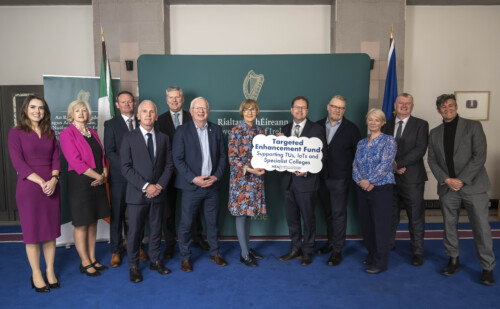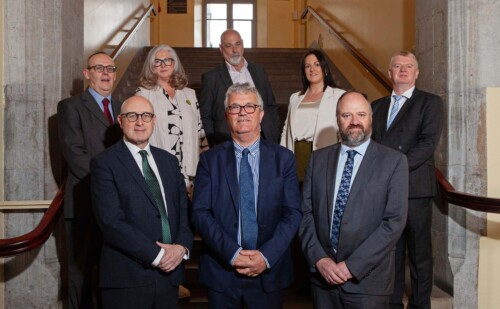Minister Bruton publishes performance report into Ireland’s higher education system
By Maura O'Shea
Posted: 19 December, 2016
The Minister for Education and Skills, Mr. Richard Bruton TD, today (Monday 19th December) published a Performance Report into Ireland’s Higher Education system. The Performance Report reviews the performance of the Irish higher education system for the years 2014 and 2015, in critical areas such as access, responsiveness to skills needs.
Minister Bruton said, “Higher education is a central part of our plan as a Government to support a strong economy and a fair society. Correctly, there has been a lot of public debate around the international rankings of third level institutions here and around the world. These rankings have too narrow a focus, and do not look at the performance of a third level institution as a whole. The rankings do not consider if access is improving, the quality of teaching and learning, or the impact an institute has on developing a vibrant community and a strong economy. Fifty per cent of the marks given by the private companies that carry out these surveys are to the opinions of academics around the world, many of whom may have no direct experience or knowledge of the institute they are ranking.”
“Our ambition in the Action Plan for Education is to make Ireland the best education and training system in Europe within a decade. It is important in seeking to be the best in Europe that we set targets that reflect the full range of impacts that our HEIs should have. That is why we have put in place this broader performance framework which considers a much wider range of metrics. Benchmarking ourselves against international best practice will of course be vital to measuring our progress”.
“I want to praise both the staff of the Institutions and the Institutions themselves for the resilience and innovation that they have shown over the past decade in delivering more high skilled graduates to the workforce at a time of significant resource constraints. In addition to this they have demonstrated a capacity to react quickly to meet identified emerging skills gaps in key areas.”
“I also want to acknowledge and thank the Higher Education Authority for their work in driving this process of strategic dialogue with the institutions.”
“Today’s results are a testament to the quality of our third level institutions and their staff, who have maintained their high standards of performance and innovation, despite increased student numbers and falling resources.”
The report, presented by the Higher Education Authority (HEA) to the Minister for Education and Skills, Richard Bruton T.D., outlines how the Irish Higher Education system is performing against international benchmarks. It shows that:
- The higher education system continues to expand and enrol more students, and to provide an increasing supply of graduates for the labour market. Overall student numbers in the sector increased from 196,000 in 2011/12 to about 210,000 in 2014/15.
- In addition to this general growth, additional programmes have been put in place to address specific skills needs, through the Springboard+ programme and the ICT skills initiatives.
- Ireland performs particularly strongly in terms of graduates with STEM qualifications, with 2014 Eurostat data showing that we have the second highest percentage of students in tertiary education studying science, maths and computing in the EU.
- There was a 59% increase in ICT, natural science, maths and construction graduates from 2009 to 2014.
- Evidence of ongoing improvement in teaching and learning across the system, with innovations such as the Irish Survey of Student Engagement (ISSE) and the National Employer Survey being used by institutions to review and improve the quality of the education being provided to students.
- The number and share of students from disadvantaged backgrounds and of students with a disability attending third level rose between 2012/13 and 2014/15 (from 22% to 26% and 7% to 8.8% respectively).
- The research system continues to perform well, as is evident from its outputs, measured by citations and also by measures of knowledge transfer in a broader sense. Under Horizon 2020, the higher education sector has won 62.4 per cent (€156.7m) of the €251m secured by Ireland to November 2015.
- The Irish higher education system has continued to create more and stronger international linkages, while also attracting a greater number of students to study in Ireland. In 2014/15, over 15,000 whole time equivalent, full-time students in Irish HE were international – c. 9% of full time numbers, an increase from c. 7% in 2012/13.
- Far-reaching restructuring of the higher education landscape, with ongoing institutional merger projects designed to enhance the quality and sustainability of the education provided to students attending those institutions. Successful restructuring can be seen particularly in the process for reforming initial teacher education, and in the process for the development of technological universities.
- Improved accountability of the system for public investment, through for example, this strategic dialogue process and the improved governance reviews introduced by the HEA.
- In terms of shared services, the sector performs well. HEAnet provides over 40 services to over one million first, second and third level staff and students in Ireland. A recent evaluation found that six HEAnet services saved the Irish taxpayer just under €20 million in 2014 based on an operating cost of €4.9 million.
The report also highlights the risks around the sustainability of current performance. The HEA have said that the decline in public current funding, in addition to the increases in student numbers, creates risks for a series of policy objectives:
- Sustaining a high quality student experience and a high quality of the graduates emerging from the sector
- Broadening access to higher education for those from under-represented groups
- Enhancing research performance and its contribution to social and economic development
- Achieving a stable and sustainable financial basis for the higher education system
Minister Bruton said:
“We are providing an initial investment of €36.5million in the sector next year and €160million over the next three years. This is the first significant investment in the sector in 9 years – a period in which State investment in higher education fell by 33% (€463million), during a time of growing demographics. This will allow us for the first time to keep pace with demographic increases and also introduce targeted initiatives in priority areas, in particular disadvantage, skills, research and flexible learning, with thousands of students benefiting under each heading.”
The report concludes that Ireland can be assured as to the strategic capacity and intent of its higher education institutions but must continue to resource them appropriately so as to maintain and raise standards. The HEA outlines that this is an absolute necessity if we are to continue to meet our own national skills needs and keep pace with the unrelenting progress demonstrated by our international competition.
“To build on this initial investment, we have started work on a new mechanism aimed at allowing us to put in place a comprehensive multi-year spending plan for the sector. I am working with Minister Donohoe to put in place a sustainable and predictable multi-annual funding model for Higher and Further Education from 2018 in which all beneficiaries of the third level sector can play a role. I intend to bring proposals to Government in the middle of next year on this.”
“To examine the proposals that can add to these two elements and put in place a sustainable system of funding that can deliver a world-class third level system for the medium and long term, earlier this year I published the Cassells report, and as committed to in the Programme for Government that report is currently with the Oireachtas Committee. This is an area where broad political consensus is needed on the future direction, and I will be working to build that consensus.”
Fergal Costello, Head of System Performance at the HEA said “Evaluating system and institutional performance is one of the most important tasks undertaken each year by the Higher Education Authority. The process is an attempt to better account for the significant levels of annual investment in the higher education sector, and to ensure that national policy priorities and directions as well as particular regional priorities are reflected in the work of institutions across the country. It requires each institution to measure, evaluate and report on progress against their strategic goals, and to engage with the HEA on challenges and opportunities. It is a demanding process for the institutions that also requires them to benchmark themselves against comparable international institutions. The report shows that higher education continues to play a central role in Ireland’s social and economic development. It also shows the evolution of the system, notably in the restructuring of initial teacher education in Dublin and Galway, and in ongoing progress towards the development of technological universities”.
Next Steps:
In terms of overall steering of the system, the Minister outlined that his Department is now leading on the development of a new System Performance Framework for Higher Education for the period 2017 – 2021 which will set out the ambition, goals and objectives for higher education for the five year period. The Minister intends to ensure that goals and objectives for the sector are aligned and supported by appropriate funding mechanisms in order to appropriately incentivise and reward the performance of institutions – in areas like research, skills and access for students from disadvantaged areas and other underrepresented groups.


